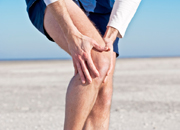Conditions & Services
Conditions
Osteoporosis
 The term "osteoporosis" comes from the Greek words for "bone" and "porous." It is a disease characterized by increasing bone loss which can lead to fractures, height loss and a hump-backed appearance.
The term "osteoporosis" comes from the Greek words for "bone" and "porous." It is a disease characterized by increasing bone loss which can lead to fractures, height loss and a hump-backed appearance.
A diagnosis of osteoporosis is made after a complete medical history, physical examination and laboratory tests including X-rays and bone densitometry. Lost bone can now be replaced, and for most your doctor will work with you to prevent further weakening. The treatment plan may include exercise, diet changes, hormone therapy with estrogen (ERT) or anti-estrogens (SERMs), bone-preserving medications such as Calcitonin or Bisphosphonates and bone building medication like Teraparatide.
Osteoarthritis
Osteoarthritis (OA), or "wear and tear" arthritis, is a degenerative joint disease in which the cartilage cushioning the joint slowly wears away. The bone ends then rub together whenever the joint moves, and the fluid-filled capsule enclosing the joint (the synovium) becomes inflamed.
OA frequently affects weight-bearing joints such as the hips, knees and spine. Although it can occur to anyone at any age, OA most often affects the elderly, particularly women. Risk factors include obesity, a family history of the disease, previous injury or infection in the joint, and an injury that puts increased pressure on the joint.
Rheumatoid Arthritis
 Rheumatoid arthritis (RA), a type of inflammatory arthritis, is a chronic condition in which the body's own immune system attacks the joint lining, causing it to swell. This autoimmune disorder can cause pain even when the joints are not being moved. RA is the most common inflammatory arthritis affecting the hips and knees on both sides of the body, resulting in difficulty walking or moving and a loss of muscle strength.
Rheumatoid arthritis (RA), a type of inflammatory arthritis, is a chronic condition in which the body's own immune system attacks the joint lining, causing it to swell. This autoimmune disorder can cause pain even when the joints are not being moved. RA is the most common inflammatory arthritis affecting the hips and knees on both sides of the body, resulting in difficulty walking or moving and a loss of muscle strength.
Polymyalgia Rheumatica
Polymyalgia rheumatica is an inflammatory condition that causes pain and stiffness in certain muscles sometimes as part of another disease, or for no apparent reason.
To diagnose polymyalgia rheumatica, your doctor will perform a physical examination and a series of blood tests that detect inflammation and other abnormalities within the blood levels. Effective treatment can also confirm a diagnosis of this condition. Your doctor will determine an appropriate course of treatment for you based on a thorough evaluation of your individual condition.
Gout
Gout is a form of arthritis that causes painful, swollen, red and inflamed joints. Gout is caused by a buildup of uric acid that forms crystals in the joints and surrounding tissue. Uric acid is a natural waste product of the body that is normally filtered out of the bloodstream by the kidneys and excreted during urination. Patients with gout have an abnormal metabolism that reduces the effectiveness of the kidneys, causing uric acid to accumulate in the blood.
Treatment of gout includes medication to relieve symptoms of pain and inflammation, and may include the following:
- Nonsteroidal anti-inflammatory drugs
- Corticosteroids
- Colchicine
Other medication may be prescribed to block the body's acid production or to improve the kidneys' ability to remove uric acid. Certain dietary changes, such as eating moderate amounts of protein and drinking plenty of water, may also help reduce the amount of uric acid in the blood. Limiting alcohol intake and maintaining a healthy weight can also help to reduce gout attacks.
Spondyloarthopaties
Spondyloarthopaties are any joint disease of the spine, joints and other tissues that contain collagen. Types of spondyloarthopaties we treat include:
|
|
Connective Tissue Disorders
Dr. Oparaeche treats several connective tissue disorders, including:
|
|
Rare Autoimmune & Connective Tissue Disorders
 Autoimmune diseases are those that occur when the immune system reacts abnormally and attacks its own body. The cause of autoimmune diseases is not known, but is believed to be affected by exposure to microorganisms or other environmental factors. Treatment depends on the type of disease but may include medication, Stress control, corticosteroids and nutritional supplements. Call us today to figure out how to deal with your symptoms.
Autoimmune diseases are those that occur when the immune system reacts abnormally and attacks its own body. The cause of autoimmune diseases is not known, but is believed to be affected by exposure to microorganisms or other environmental factors. Treatment depends on the type of disease but may include medication, Stress control, corticosteroids and nutritional supplements. Call us today to figure out how to deal with your symptoms.
The rare autoimmune and connective tissue disorders we treat include:
- Relapsing Polychondritis
- Sarcoidosis
- Bechets
Raynaud's Syndrome
Raynaud's syndrome (RS) is a vascular condition that results in a discoloration of the fingers and toes after exposure to hot or cold temperatures or in response to emotional stress. RS is more common in women than in men, and involves a constriction of blood vessels in the affected area that cause the skin to change color temporarily. This condition can also affect the nose, lips or earlobes in some patients.
RS may occur on its own or as a result of an underlying condition such as scleroderma, lupus or other autoimmune diseases. Treatment aims to reduce the frequency and severity of attacks, and may include keeping warm, managing stress, quitting smoking, biofeedback or medications (sometimes applied locally). Treating an underlying condition often improves symptoms of RS.
Lyme Disease with Arthritis
Lyme disease is a bacterial illness that is spread by deer ticks and can cause abnormalities of the skin, joints, heart and nervous system. Most cases of Lyme disease can be effectively treated when diagnosed early. Common symptoms of this condition include a rash at the site of the tick bite, followed by joint pain and flu-like symptoms. Lyme disease is usually treated with oral antibiotics that clear the infection and prevent future complications.
To learn more about these conditions or the services we provide, call the location nearest you.


